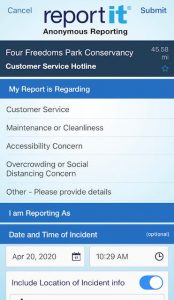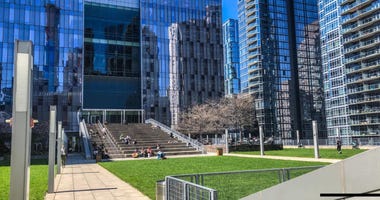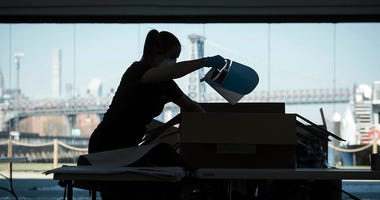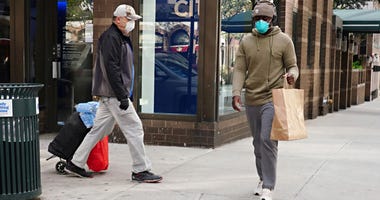
Neil A. Carousso produces NewsNation original “Kurt’s Country” – a celebration of country music and a slice of Americana with host Kurt Bardella.
-
Four Freedom Park Conservatory Uses Anonymous Tip App To Enforce Social Distancing On Roosevelt Island
Post Views: 839By Neil A. Carousso
NEW YORK (WCBS 880) – Four Freedom Park Conservatory on Roosevelt Island is employing patented technology to keep people six feet apart at all times to slow the spread of COVID-19.
“They’re very proactive in wanting to encourage people to communicate these type of things,” said Anthony Lavalle, founder of report it® – a patented application that partners with schools, businesses and law enforcement agencies to expedite anonymous tips for non-emergencies.
Four Freedom Park Conservatory, Inc. operates and maintains the Franklin D. Roosevelt Four Freedom State Park. It also produces events at the park located at the southern tip of Roosevelt Island, overlooking the United Nations on Manhattan’s East Side. It has been a client of report it® for a few years and approached them about developing a solution to enforce social distancing.
“We geofence an area,” Lavalle explained.
A geofence is a virtual geographic boundary that enables software to trigger a reaction when a smartphone enters or exits a defined area. Report it® sets up geofencing for its partners throughout the country to enable users to submit an anonymous tip to companies and police to act upon in a timely manner.
The Long Island based tech company was founded in 1999 at the outset of the Internet, harnessing the capability to collect and facilitate data such as photos, videos and a description of the complaint.
The park manager will receive a report immediately with key actionable information.
“We actually capture the geographic location of where that photo was taken, so that the receiver of the report knows exactly where this is occurring and where the correction needs to be made,” he said.
Those photos are also time-stamped for verification, which Lavalle said separates report it® from other applications such as the NYC 311 app because police may respond to an incident that occurred much earlier.
The report it® app is also available in all languages.
“I think that comfort level of people being able to utilize something in their native language to escalate a concern really helps them to communicate as well,” Lavalle emphasized.
He has seen an increase in reports through the app during the coronavirus pandemic.
-
Chinese Operatives Spreading Disinformation About Coronavirus To Sow Political Discord In US: Report
Post Views: 939By Neil A. Carousso
WASHINGTON (WCBS 880) — China is looking to amplify disinformation about the coronavirus pandemic to exploit political divisions in the United States, according to a report in The New York Times.
The Times interviewed intelligence officials who work in six different U.S. agencies. The officials believe China is using tactics that resemble Russia’s efforts to sow discord during our elections by utilizing social media trolls to push agendas to sympathetic Americans who unknowingly propagate its messages.
“We’re seeing, now, tactics that are not surprising to many of us who served in government,” said Nadia Schadlow, Ph.D., former U.S. Deputy National Security Advisor for Strategy, in an interview with WCBS 880 producer Neil A. Carousso.
China is reportedly not only using social media to disseminate false information, but also sending text messages and messages via WhatsApp, which are more difficult for law enforcement to detect because it is encrypted.
One particularly unsettling message to U.S. officials that became widespread was one claiming President Donald J. Trump was set to issue a nationwide lockdown. The White House National Security Council tweeted “FAKE” in response.
Text message rumors of a national #quarantine are FAKE. There is no national lockdown. @CDCgov has and will continue to post the latest guidance on #COVID19. #coronavirus
— NSC 45 Archived (@WHNSC45) March 16, 2020
“It’s disturbing and upsetting that Americans would be taken advantage of during such a difficult time in our country’s history,” Dr. Schadlow said.
She is currently a senior fellow at the Hudson Institute, an independent policy organization in Washington, D.C. that promotes global security through research and analysis. In 2018, Dr. Schadlow advised the Trump Administration on national security strategy as an assistant to the president on The White House National Security Council.
“China’s much more of a strategic competitor to the United States,” Dr. Schadlow explained.
She noted both Democrats and Republicans have expressed concern over the Communist Party’s economic activities, including intellectual property theft.
“Essentially it wasn’t a level playing field doing business with China,” said Dr. Schadlow.
She added that when President Trump came into office in 2017, U.S. policy towards China shifted to “push back” against its malignant activities.
The World Trade Organization indicates China is the number one exporter in the world. It is also the largest supplier of goods to the United States. China accounts for 21.2 percent of overall U.S. imports, according to The Office of the U.S. Trade Representative.
Dr. Schadlow said critical technology and medicine has been manufactured in China over the last 15 years. She believes that will change as Americans prefer to have essential supplies produced in their country or U.S. allied nations.
“I do think we are going to see a shift in those areas,” the former National Security Council advisor said, adding, “There is a recognition that it is a national security concern.”
-
Schools Deliberate on Re-Opening Plan
Post Views: 927By Neil A. Carousso
NEW YORK (WCBS 880) — As schools decide whether there will be classes on campus this fall, Rockland Community College President Dr. Michael Baston speaks with WCBS’ Neil A. Carousso about their preparedness for distance learning education heading into the coronavirus pandemic plus what their plan is for the fall.
-
Small Business Survival: Brooklyn Navy Yard Manufacturers Step Up During the COVID-19 Crisis
In Best Of, Featured, Guest, Interview, Latest, News Stories, Technology, The World, Top News, videosPost Views: 1,172By Neil A. Carousso
NEW YORK (WCBS 880) – Businesses at the Brooklyn Navy Yard industrial complex are revitalizing the country’s manufacturing amid the global pandemic.
David Ehrenberg is the President and CEO of the Brooklyn Navy Yard Development Corporation, which produces roughly $2.35 billion of annual economic output for New York City among more than 400 companies located there across various industries.
“These are not your old school manufacturers. These are very high-tech, very creative hardware companies,” Ehrenberg told WCBS 880’s Joe Connolly on this week’s WCBS Small Business Spotlight focusing on small business survival, sponsored by BNB Bank.
Brooklyn Navy Yard businesses employ more than 10,000 workers – many of whom have become essential workers as they produce vital medical equipment needed to treat the coronavirus.
“Our tenants have really been doing amazing, amazing things, producing everything from medical gowns to face shields, hand sanitizer and a series of other products,” said Ehrenberg, noting that this equipment is being shipped directly to hospitals.
Bednark Studio, Voodoo Manufacturing and Farmshelf – previous WCBS Small Business Spotlight subjects housed in the Brooklyn Navy Yard – are contributing to the broad COVID-19 fight. Bednark Studio is manufacturing face shields for frontline hospital workers in the City, 3-D-printing company Voodoo Manufacturing makes FDA-approved medical devices, and Farmshelf has been on the cutting edge of the changes in the U.S. food supply that has been accelerated by the coronavirus outbreak.
“A lot of people think that manufacturing is dead in New York and it’s not,” Ehrenberg said, adding that because of lower real estate prices in Brooklyn, growing technology companies that emphasize a high standard of craftsmanship and design can attract top talent the Big Apple has to offer.
The Brooklyn Navy Yard Development Corp. head told Connolly they started communicating with New York City officials and local hospitals about their needs before they contacted business owners to discover that they were ahead of the curve.
“We had companies who were ordering materials, who have relationships with factories in China, who were buying tens of thousands of gowns be shipped over here and donated,” he said.
Ehrenberg highlighted the “civic pride” of Brooklyn Navy Yard businesses, saying owners respond to his contacts by asking if there’s more they can do to contribute to the City’s response.
https://twitter.com/NeilACarousso/status/1252988378498379777
“The supply chains have just eased up, both, because of the level of demand, but also, you have certain countries (that) are keeping supplies for themselves right now,” he said.
His tenants have been able to manufacture fully American made products in their factories even before President Donald J. Trump invoked the Korean War era Defense Production Act to mandate U.S. companies to make medical equipment. The President and other government officials, namely New York Governor Andrew Cuomo, have revealed they are relying on countries like China, where the coronavirus originated, to import life-saving equipment such as ventilators and N95 masks.
Listen to the WCBS Small Business Spotlight Podcast above to hear how businesses in the Brooklyn Navy Yard are revolutionizing American manufacturing in the time of dire need.
-
Why Americans May Choose Safety Over Privacy In The Age Of Coronavirus
Post Views: 1,180By Neil A. Carousso
NEW YORK (WCBS 880) — Health experts are stressing the need to monitor COVID-19 patients to slow the pandemic, but Americans’ privacy is at stake.
“We’re looking for a quick solution, we’re not thinking about privacy issues, necessarily,” said Robert J. Strang, a former special agent with the FBI, Department of Justice and the Drug Enforcement Administration. He was named co-chair of the New York State anti-terrorism task force after the terrorist attacks on September 11, 2001.
“If you look back on the Patriot Act and some of the things that we decided we were going to do after 9/11 and then turn back the pages a little bit as time went on, I have a feeling that’s the same kind of situation that we’re in right now,” Strang told WCBS 880 producer Neil A. Carousso.
He is the Chief Executive Officer of Investigative Management Group where he specializes in personal and corporate security and investigations. He believes Americans support tracking in the name of national security.
“They want to be able to do whatever it takes to keep them safe, to keep their families safe, to keep their employees safe, their communities safe,” Strang said, adding, “If it means monitoring individuals who’ve had the coronavirus, if it means monitoring hospitals, I think people, at this point in time, are okay with it.”
Centers for Disease Control and Prevention Director Robert Redfield said smartphone tracking is under “aggressive evaluation.”
While the U.S. has not endorsed specific tracing technology, there are a few states looking to develop systems. Researchers at the Massachusetts Institute of Technology launched the “Safe Paths” initiative to use anonymized GPS data and Bluetooth to track interactions and notify people if they’ve encountered someone who has been infected with COVID-19. Stanford University and Seattle-based CoEpi are working with the MIT team to develop an anonymous standard for contact tracing technology.
Apple and Alphabet’s Google announced last week it will help national, state and local governments launch contact tracing apps to monitor the whereabouts of people who contracted the coronavirus.
China has taken the most aggressive steps to monitor the original center of the outbreak. The Communist Party is tracing the identities of residents who left Wuhan through mobile phone numbers and location data.
South Korea investigators are utilizing smartphone data to find where people contracted the virus. They can make that determination within 10 minutes.
Western Australian lawmakers passed a bill to install home monitors for those under quarantine.
Moscow authorities said they are using facial recognition technology to target Chinese people who break quarantine in Russia.
When asked how he would advise the Trump Administration on implementing a contact tracing program, if he were asked, Strang said he would ask those who contracted COVID-19 for “consent.”
“I think most people would cooperate and would voluntarily agree to certain restrictions on their freedom,” Strang said but stipulated there had to be a set time frame to limit the possibility of government overreach.












